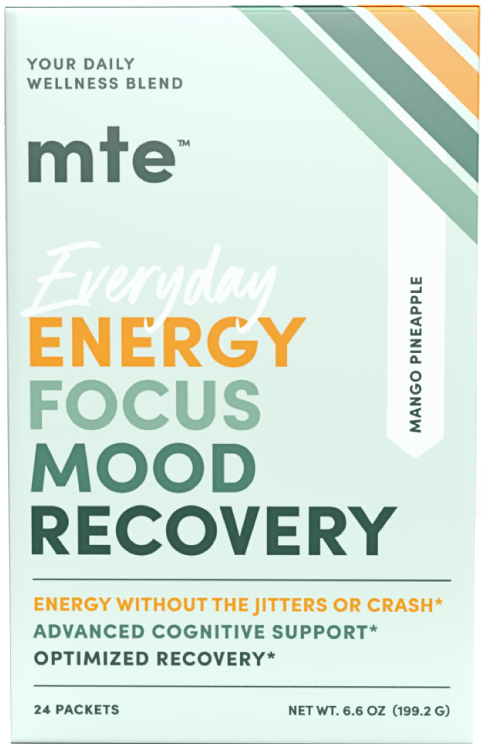
Everything You Need to Know About Acetylcholine & Adaptogens
One neurotransmitter that doesn’t get nearly enough attention for the important roles it plays is acetylcholine. Unless you’re into brain biology or have a relevant condition that involves this particular neurochemical, you might not even have heard of it.
Often referred to as the learning molecule for its role in cognition, this important neuromodulator is one of the major biological factors that regulates stress responses and plays into difficulties with mood and emotional reactivity. And if your levels are off, you’re likely not feeling your best.
So let’s look at this neurotransmitter's role in stress and chronic unease, why it matters, and how naturally supplementing low levels can support improved stress resilience and mood:
Brain-Based Activities of the Learning Molecule
This multitalented neurotransmitter plays numerous roles throughout the body – in the brain, across the central nervous system, and in several vital organs. Two of its most far-reaching functions are:
(1) Motor Function
It can be found in every motor neuron in your body and is basically the entire reason your muscles can contract. We’re talking heartbeat, digestion, blinking, movement – pretty much everything about being alive.
(2) Neuromodulation
It acts as a messenger but also a manager when it comes to neuronal activity in the brain. As such, it plays a role in arousal, learning, memory, attention, and REM sleep. This pro-cognition chemical is what signals your PNS to wake up and tell your SNS to calm down after a stressful event. So you can imagine the implications of not having enough.
The Learning Molecule & Stress: How it Works
The activity of ACh is vital to reversing the effects of a flight-flight-or freeze response, of which, unfortunately, many of us are chronically in a low-level state.
The presence of a stressor tells the SNS, “IN DANGER” and sets the stress response into motion, charging your the glands that secrete the chemical messengers that make us feel alert, zoned-in and ready to go.
The learning molecule is the neurotransmitter that steps in after the danger’s passed to let everybody know it's all clear.
Once the PNS decides everything is back to okay, it sends some of this neurotransmitter to tell the SNS, “SAFE NOW”, which promotes biological rest and restoration – stress levels lower, your glands stop secreting pro-stress messengers, blood pressure and heart rate return to normal, and heightened arousal is reversed.
The Importance of Balanced ACh Activity
Here’s the thing – when this communication comes out of balance, your stress response is unintelligible. And because we’re all chronically stressed despite not chronically being in danger, our brains get confused and super tired.
Stress hormones wreak havoc on the body when levels are raised long-term, so when the learning molecule gets lost or doesn’t have the space/energy to properly communicate, you can bet your mental health isn’t on point. Low levels of this neurotransmitter have been associated with with a host of major psychological conditions as well as neurodegenerative diseases.
Something we found particularly interesting in the course of our research is the prevalence of tobacco use in neuropsychiatric patients. Lifetime smoking rates in people diagnosed with these types of disorders are 2 to 3 times higher than in the general population.
At first, this may seem irrelevant to our conversation, until you consider the fact that nicotine acts as an agonist for the learning molecule – meaning it increases its activity. In fact, this neurotransmitter acts directly on nicotinic receptors. Population studies indicate that smoking may serve as a way for people living with psychiatric conditions to self-medicate.
Obviously not the healthiest option, but an instance of utilizing bioactive plant compounds to manage stress responses and mood – which we’ll get to shortly.
But hold up – because life is about moderation; too much of the learning molecule, especially in people who have increased sensitivity to excitatory neurochemical activity, can also have negative effects on stress and mood via overactivation of the PNS. Too much of this neurotransmitter can contribute to:
- Emotional dysregulation and reactivity
- Sleep disturbances
- Tremors
- Dystonia
- Neurocognitive issues/degeneration
Why the goldilocks vibe? It all comes back to this neurochemical's role in motor function: signaling by the learning molecule affects motor function of the emotion/mood/memory centers of the brain. This is why people with mood dysregulation and psychoses are often treated with seizure medications, because they directly target that motor-based signaling.
Adaptogens & The Learning Chemical: Biohacking Stress
There is no magic pill for regulating your brain’s production and activity of the learning molecule (a) because no neurotransmitter acts in a vacuum – it needs a balanced support system to work, and (b) because too much may be as bad as too little, especially if the rest of your brain’s communication system is out of whack.
Simply raising low levels may cause other issues like too much REM sleep and decreased sleep quality, low mood, or even increased stress reactivity in people predisposed to neuroexcitatory sensitivity. Instead, to promote stress resilience physically and mentally, natural remedies like adaptogens can go a long way in helping your body back into homeostasis.
Adaptogens are bioactive plant-based compounds found in nature which support the body’s stress responses, especially the healthy version of the IN DANGER-SAFE NOW cycle, which is integral to managing chronic stress and supporting a balanced mood. Most adaptogens have demonstrated a wide range of potential neuromodulating effects, and a few of them may help regulate levels of the learning molecule. These include:
- Bacopa monnieri
- Ginkgo balboa
- Rhodiola rosea
- Ashwagandha
Why Use Ashwagandha for Stress Support
We definitely fan-girl out about ashwagandha at MTE. It is perhaps the most potent and multitalented of the adaptogens, plus, it’s got some of the most compelling clinical data behind it. Not to mention several thousand years of use in traditional medicine across the world. That’s gotta mean something.
One of ashwagandha’s many talents is helping the brain and body adapt to stress. When it comes to the evidence that ashwagandha acts as a neuromodulator for the all-important, way-more-than-just-learning molecule, recent literature has revealed some pretty serious implications:
- In an 8-week randomized, double-blind, placebo-controlled study, ashwagandha showed greater reductions in several stress markers, including blood pressure, tension, pulse rate, c-protein, and stress indicators in chronically-stressed adults.
- A 2012 double-blind, randomized, placebo-controlled study in adults with self-reported chronic stress showed ashwagandha supplements lowered levels of stress hormones.
- In 2 double-blind, placebo-controlled studies from 2000 and 2013, ashwagandha supplementation led to greater reductions in adults experiencing chronic unease.
These are just a few snippets from a large body of research supporting ashwagandha’s potential anxiolytic and mood-boosting effects. Related studies indicate that a major mechanism that results in these anti-stress and mood benefits are because ashwagandha inhibits activity of the neurochemical that sweeps the learning molecule away. Basically, ashwagandha gives it more time and space to do the good stuff before allowing its counterpart to get rid of it.
Manage Stress & Mood with the Support of MTE
The wellness and supplement industry isn’t ignorant of the many benefits adaptogens like ashwagandha can offer us in a healthy way that’s already native to our bodies. And we’re no exception. MTE includes several adaptogens that support stress resilience by promoting positives like balanced communication between systems while supporting against negatives like nervous system overactivation and stress spikes.
Using the things nature already figured out for us, MTE harnesses the power of bioactive plants to give you the tailwind you need to live your fullest, most fun life. Wanna know more? Check out our deep dive articles on adaptogens and ashwagandha.



